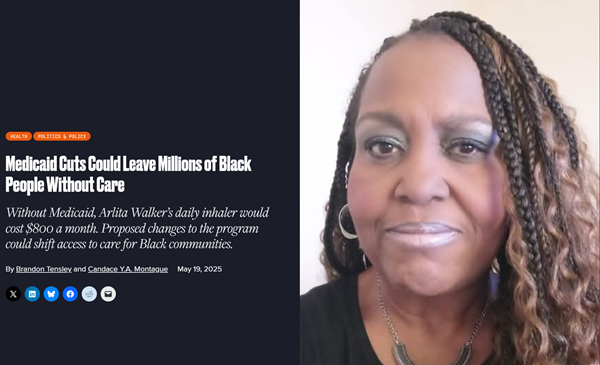Medicaid Cuts Could Leave Millions of Black People Without Care
By Brandon Tensley and Candace Y.A. Montague
May 19, 2025
 Arlita Walker lives a fairly quiet life in southwest Memphis, Tennessee. The 60-year-old grandmother was employed with Federal Express for 15 years while she also raised her daughter. But when the toll of lifting heavy packages started to harm her health, Walker had to quit; she’s been grappling with health challenges since 2013.
Arlita Walker lives a fairly quiet life in southwest Memphis, Tennessee. The 60-year-old grandmother was employed with Federal Express for 15 years while she also raised her daughter. But when the toll of lifting heavy packages started to harm her health, Walker had to quit; she’s been grappling with health challenges since 2013.
Since then, Walker has managed to get her high blood pressure and diabetes under control, but she still battles with chronic obstructive pulmonary disease, which at times makes it difficult for her to breathe. She relies on a prescription medication called Trelegy Ellipta, an inhaler that she uses once a day. It carries a hefty price tag — $800 for a 30-day supply.
Medicaid has helped Walker to afford this life-saving treatment. It also has covered her blood thinner, copays, and transportation to her doctor’s appointments. But that access is in doubt for her and the 72 million people — one-fifth of the U.S. population — enrolled in the government health care program for low-income people and people with disabilities.
On Thursday, ahead of House Speaker Mike Johnson’s Memorial Day deadline, House Republicans passed a bill that would impose strict work requirements for Medicaid. The bill will almost certainly undergo changes in the Senate.
Black Americans would bear the brunt of a Medicaid overhaul: About 20% of Medicaid enrollees are Black, while Black Americans make up just 14% of the U.S. population. Making big changes to the program also could devastate rural hospitals that depend on Medicaid reimbursements.
“What I’m worried about is that we will have to come out of our pockets [to pay]. And we all live on a fixed income, so we really don’t have that kind of money,” Walker told Capital B.
Walker’s monthly income stems from $1,170 in disability and $58 in food assistance. These payments must cover rent ($750), utilities ($200), and expenses for her 11-year-old granddaughter, who lives with her.
“And she can eat,” Walker said with a laugh.
If she has to finance her medical affairs without any help, she said, she’ll go bankrupt.
“It’s a lot of trying to figure out how to rob Peter to pay Paul, right? And make sure that everybody gets something,” she said. “You can’t win for losing.”
Medicaid’s uncertain future has left enrollees feeling helpless.
“I don’t like this [waiting],” Walker said. “If you want to do something, then give us a heads-up and do what you’re gonna do. Because we’re gonna have to find a way to make things happen.”
Democratic lawmakers have been condemning their Republican colleagues’ plans to target Medicaid.
“Medicaid has been a lifeline for millions of families in this country, but it has also helped us address critical disparities in health for Black communities,” U.S. Sen. Lisa Blunt Rochester of Delaware told Capital B in a statement, referring to how the program has helped to address the Black maternal health crisis. “Without access to this care, we risk exacerbating deep-rooted inequalities and putting lives at risk.”
Read on for a look at what might lie ahead for Medicaid — and how different lawmakers are responding. This story will be updated as legislative developments occur.
What changes are lawmakers considering?
Republican lawmakers are scrambling to figure out how to find billions of dollars in savings so that they can advance President Donald Trump’s domestic agenda.
The House bill passed on Thursday ties Medicaid eligibility for physically able adults to “community engagement requirements.” The qualifications for the program would…
[READ THE COMPLETE ARTICLE HERE]
